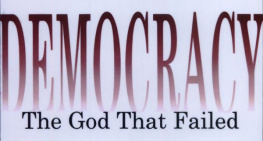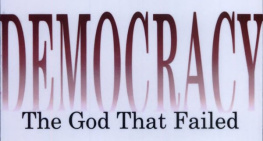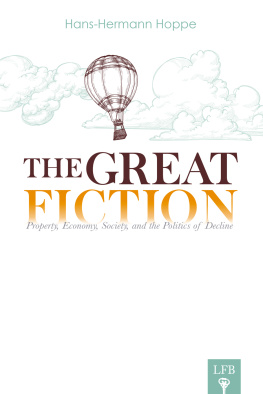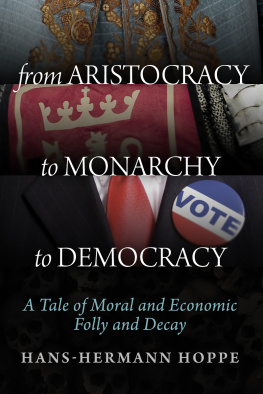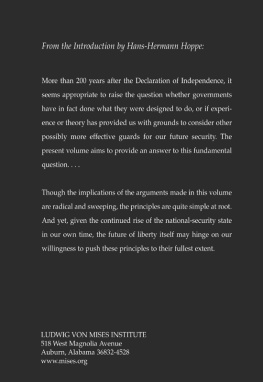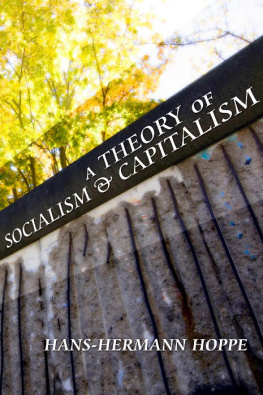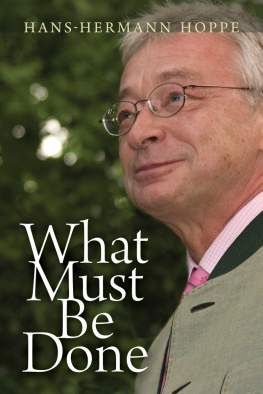A SHORT HISTORY OF MAN
The Mises Institute dedicates this volume to all of its generous donors and wishes to thank these Patrons, in particular:
Adam J. Bagby
Douglas E. French and Deanna L. Forbush
Jing Jin and Wai Chan
Charles and Anne-Lisbeth Sebrell
Elijah Joel Smith
John Tate
Anonymous
John Bartel
Richard Beverly Bleiberg
Herbert Borbe
Jorge Carlos Borlandelli Zeballos
Mary E. Braum
Dietmar Georg
Hunter Hastings
Albert L. Hillman, Jr.
Richard J. Kossmann, MD
David Kramer
Arthur L. Loeb
The Morgan Report
R. Nelson and Mary Nash
Jorge Roca Arteta
Morten Rustad
Reginald Thatcher
Joseph Vierra
A SHORT HISTORY OF MAN
PROGRESS AND DECLINE
AN AUSTRO-LIBERTARIAN RECONSTRUCTION
Hans-Hermann Hoppe
Mises Institute

Mises Institute , founded in 1982, is a teaching and research center for the study of Austrian economics, libertarian and classical liberal political theory, and peaceful international relations. In support of the school of thought represented by Ludwig von Mises, Murray N. Rothbard, Henry Hazlitt, and F.A. Hayek, we publish books and journals, sponsor student and professional conferences, and provide online education. Mises.org is a vast resource of free material for anyone in the world interested in these ideas. For we seek a radical shift in the intellectual climate, away from statism and toward a private property order.
For more information, see , or phone us at 1.800.OF.MISES.
Mises Institute
518 West Magnolia Avenue
Auburn, Alabama 36832
On the Origin of Private Property and the Family and From the Malthusian Trap first appeared in Hans-Hermann Hoppe, The Great Fiction: Property, Economy, Society, and the Politics of Decline (2012); reprinted with permission of Laissez Books (Baltimore, Maryland).
From Aristocracy to Monarchy to Democracy was published as a booklet by the Mises Institute (2014).
Cover design by Chad Parish featuring ancient cooking and storage pots and the historical and ancient beehive houses in anlurfa, Turkey.
Published 2015 by the Mises Institute and licensed under a Creative Commons Attribution-NonCommercial-NoDerivs 4.0 International License.
http://creativecommons.org/licenses/by-nc-nd/4.0/
Mises Institute
518 West Magnolia Avenue
Auburn, Alabama 36832
mises.org
ISBN: 978-1-61016-591-4
eISBN: 978-1-61016-640-9
To
Glin
CONTENTS
FOREWORD
Hans-Hermann Hoppe is one of the most remarkable libertarian scholars of our time. He began as a prize student of Jrgen Habermas, the famous German philosopher and social theorist. Habermas was, and remains to this day, a committed Marxist. He is the leader of the notorious Frankfurt school.
Habermas was very impressed with Hans, and, under the patronage of this eminent Marxist, Hans had every reason to expect a stellar academic career in his native Germany. A problem soon arose, though, one which has had happy results for all those who love liberty. Hans soon came to realize that the leftism and socialism he had grown up with was intellectually barren and morally bankrupt. He discovered on his own the great works of Ludwig von Mises and Murray N. Rothbard.
Austrian economics and Murrays anarchism were not what Habermas had in mind. By becoming a libertarian, Hans effectively ended his chances for a chair at a major German university, even though his intellectual accomplishments easily qualified him for one. Like Murray, though, Hans is a scholar of complete intellectual integrity. He would not surrender what he had come to realize was the truth, whatever the cost to his own career.
Hans decided to come to United States in order to study with Murray, who was then teaching in New York. When I met him, I was struck by Hanss firm commitment to Rothbardian principles and his outstanding intellectual ability. Murray, of course, immediately grasped Hanss potential. When Murray was named to an endowed chair in economics at the University of Nevada, Las Vegas, he worked to get Hans a position in the economics department as well. Together, the two of them made UNLV a major center for the study of Austrian economics; and they did so in the face of much opposition from some of their departmental colleagues.
Murray was especially intrigued by one of Hanss main arguments. Hanss teacher Habermas pioneered an approach to ethics based on the conditions for engaging in rational argument. In a way that Habermas would hardly approve, Hans turned Habermass ethics on its head. Instead of support for socialism, argumentation ethics as Hans explained it provided powerful support for self-ownership and private property. Murray heartily approved and highly praised Hanss argument:
Hans Hoppe has ... deduced an anarcho-Lockean rights ethic from self-evident axioms. Not only that: he has demonstrated that, just like the action axiom itself, it is impossible to deny or disagree with the anarcho-Lockean rights ethic without falling immediately into self-contradiction and self-refutation. (Liberty, November 1988)
Hans had reversed Habermas; but not content with this, he again overturned conventional opinion. Like Murray, Hans is an anarcho-capitalist. The best government is no government at all. The question nevertheless arises: in a world of states, what type of government is the least bad? Almost everybody says democracy. Unfortunately, many libertarians agree. Hans showed in his classic Democracy: The God That Failed that democracy leads to profligate spending and reckless policies. Those in power know that they will remain in charge only for a limited time. Their attitude will be get all you can and get it now. By contrast, a king will tend to be less exploitative. He will try to preserve the lives and property of his subjects, because he is no temporary ruler, and wants to pass on a prosperous kingdom to his heirs. Hans of course did not say that monarchy was a good thing, just that it tends to be better than democracy. The great Catholic classical liberal Erik von Kuehnelt-Leddihn, who had influenced Hans, said this was a brilliant insight.
From Aristocracy to Monarchy to Democracy, one of the essays included in A Short History of Man, summarizes Hanss position. Readers of this scintillating work will discover that if monarchy is better than democracy, aristocracy is better still. If you havent read Hans before, you have a treat in store for you. In just a few pages, he will make you question everything you have ever read about government.
Throughout A Short History of Man, Hans shows how the lessons of Austrian economics can be used to help us understand history. In doing so, Hans is following the path laid down by his great mentor, Murray Rothbard. Like Murray, Hans is a scholar of near universal interests. He is fully at home in anthropology and sociology, as well as global history, economics, and philosophy.
Drawing on his vast knowledge and Austrian insights, Hans addresses two questions. How did the family and private property originate? How did the Industrial Revolution get started? Readers will see how the development of secure property rights and the free market has been essential to human progress. The question for our times then is: Will these developments continue, to the great benefit of mankind, or will the state be able to thwart them?
In its use of economics and philosophy to illuminate history, A Short History of Man


